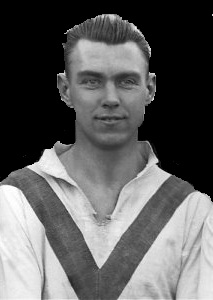In the early years of its existence the FA tended to use The Empire Stadium Wembley only for the FA Cup Final, which was played there every year from 1923 onwards. 1930 was the 3rd time that the England v Scotland match had been held there. Less lucrative games against Wales and Ireland were still played at league grounds. Remarkably the England Scotland game was only the tenth football match played at Wembley in 7 years.
Wembley Stadium ltd, (managing director the noteworthy entrepreneur Mr Arthur Elvin) was a private company. Mr Elvin had shrewdly developed the company and effectively saved the stadium from demolition following the Empire Exhibition of 1924. He was always on the lookout for attractions to maximize the use of the stadium, leading to the introduction of speedway, greyhound racing and the construction of the Wembley Arena.
5th April 1930: British Home Championships
England 5 Scotland 2
(87,375)
In the previous decade England had only won 2 matches against Scotland (1920 & 27) and had not won the British Home Championships outright since 1913. The previous 2 meetings of the old rivals had seen Scotland's famous Wembley Wizards' 5-1 victory in 1928 and a 1-0 win for Scotland at Hampden in 1929.
For the 1930 fixture England fielded 4 debutants (Strange,Webster, Crooks and Rimmer). England controlled the game. They were 4-0 up at half time thanks to Watson (2), Rimmer and Jack. Fleming pulled 2 goals back for Scotland in the second half but these were separated by Rimmer's 2nd and England's 5th.
Line ups:
England: Harry Hibbs (Birmingham City); Roy Goodall (Huddersfield Town); Ernie Blenkinsop; Alf Strange (both Sheffield Wednesday); Maurice Webster (Middlesbrough); Billy Marsden (Sheffield Wednesday); Sammy Crooks (Derby County); David Jack (Arsenal(c)); Vic Watson (West Ham United); Joe Bradford (Birmingham City); Ellis Rimmer (Sheffield Wednesday).
Scotland: Jack Harkness (Heart of Midlothian); Dougie Gray (Glasgow Rangers); Tommy Law (Chelsea); Jock Buchanan; Davie Meiklejohn (c); Tully Craig (all Glasgow Rangers); Alex Jackson (Huddersfield Town); Alex James (Arsenal); Jimmy Fleming (Glasgow Rangers); George Stevenson (Motherwell); Alan Morton (Glasgow Rangers).
26th April 1930: FA Cup Final
Arsenal 2 Huddersfield Town 0
(92,499)
Herbert Chapman's Arsenal faced his former charges Huddersfield Town in the 1930 Cup Final. It will sound strange to modern fans that Huddersfield were the more successful of the two clubs at the time. In the six seasons from 1922 they had finished in the top 3 of the first division (winning the title three years in succession) and were appearing in their 4th Cup Final in 10 years. Arsenal , on the other hand, had appeared in one FA Cup Final and had yet to claim any silverware of note.Their 2-0 win thanks to goals by Alex James and Jack Lambert was the beginning of an episode in the club's history that saw them permanently elevated to the ranks of the greats.
Line ups:
Arsenal: Charlie Preedy; Tom Parker (c); Eddie Hapgood; Alf Baker; Bill Seddon; Bob John; Joe Hulme; David Jack; Jack Lambert; Alex James; Cliff Bastin (Manager: Herbert Chapman)
| Huddersfield Town: Hugh Turner; Roy Goodall; Bon Spence; Jimmy Naylor; Tom Wilson (c); Austen Campbell; Alex Jackson;Bob Kelly; Harry Davies; Harry Raw; Billy Smith (Manager: Clem Stephenson) |
|---|
What next...
Clapton Orient versus Brentford?
Yes.
The idea of Wembley being used by the lesser lights was not a new one.
A prospective London based club (that never really existed) called Argonauts were able to give assurances that Wembley would be their home ground when they unsuccessfully applied to the Football League in 1928, 1929 and 1930.
So, why Clapton Orient?
Orient (today's Leyton Orient) had moved into a new ground at Lea Bridge Road (Hackney, London) at the beginning of the 1930 season. There was a problem , however. The speedway track was too close to the pitch and the pitch was already the minimum permitted width. Restructuring was necessary. Orient unsuccessfully approached both Leyton FC and Walthamstow Road about temporarily using their grounds. So Wembley it was.
22nd November 1930: League Division Three (Southern Section)
Clapton Orient 3 Brentford 0
Clapton Orient: Arthur Wood; Ernie Morley;Tom Evans; Eddie Lawrence; Jack Galbraith; Jimmy Bolton; Rollo Jack; Arthur Cropper; Reg Tricker; Jack Fowler; Charlie Fletcher.
Brentford: Fred Fox; Alex Stevenson; Tom Adamson; Reg Davies; Jimmy Bain;Harry Salt; Jack Lane; Jackie Foster; David Sherlaw; Cecil Blakemore; Bill Berry.
goals:
| Tricker |
| Cropper (2) | ||||
Before this game Orient were 17th and Brentford 3rd.
The Daily Herald commented unfavourably on the 'quagmire' of a pitch. There was no Zeppelin and no King George.
Orient's next game was an FA Cup replay against Luton Town that was played at Highbury, but they returned to Wembley for their next home league match:
6th December 1930:League Division Three (Southern Section)
Clapton Orient 3 Southend United 1.
(1,916)
Clapton Orient:Harry Blackwell; Ernie Morley; Billy Broadbent; Eddie Lawrence; Jack Galbraith; Jimmy Bolton; Rollo Jack; Arthur Cropper; Reg Tricker; Jack Fowler; Charlie Fletcher.
Southend United: Billy Moore; Jackie French; Dave Robinson; Bob Ward; Joe Wilson; Bill Johnson; Fred Barnett; Mickey
Jones; Jimmy Shankly; DickieDonoven; Arthur Crompton.
goals:
Fowler (2)
Jones
Tricker
Before this game Orient were 16th, Southend 4th.
Reg Tricker
Following the Wembley adventure Orient's next home game, a 2-0 win over Norwich City back at Lea Bridge,was watched by 3,359.
By the by:
Both David and Rollo Jack made 2 Wembley appearances in 1930.
David Jack and Alex Jackson played on the opposing team in both the FA Cup Final and the England Scotland game.
Alex James and Alex Jackson played alongside each other and against each other-
as did Alex James and David Jack.


